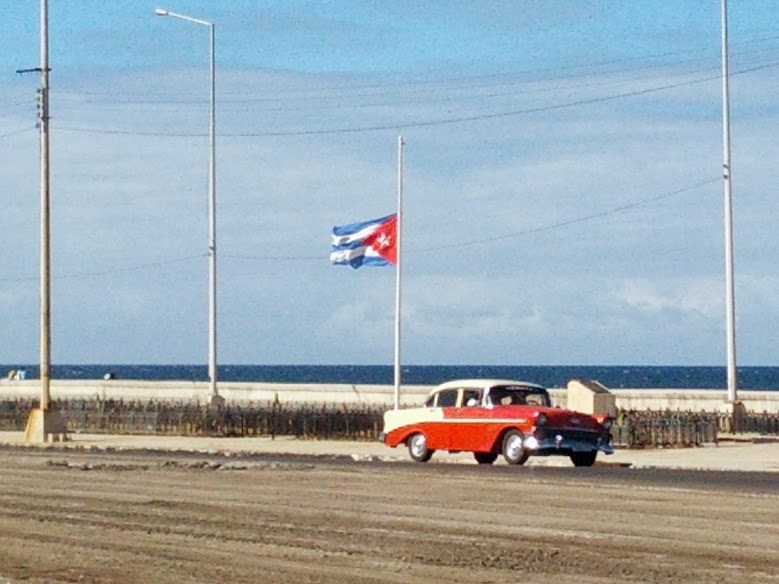I'll provide more details about our experience in Havana and finally meeting our relatives in the next post. First, I want to talk about getting to Cuba, because traveling there is complicated, especially for US citizens. Therefore, I've put together some tips based on what we learned from our trip.
The USA still imposes an embargo against Cuba. It has been active since 1962, when the Cuban government nationalized everything, including the property of US citizens and corporations. The embargo was codified into law in the 90's, imposing further restrictions on Cuba unless the country moved toward democratization. This means that legally, most Americans cannot spend money in Cuba.
There are exceptions.
We Traveled Legally
***UPDATE*** As of December 2014, restrictions for US citizens traveling to Cuba have been relaxed. Please read the latest guidelines from the US Government here.
The Obama administration eased the travel ban in 2009, allowing Cuban-Americans to travel freely to Cuba. Students, religious missionaries, journalists, researchers and other special interest groups may visit if they meet specific requirements and apply for authorization from the Treasury Department. In all cases, Americans must have a purpose to travel to Cuba other than tourism - whether it's to see family, volunteer, or participate in some kind of research project.
Our purpose was to meet and spend time with our family and see the neighborhoods where my grandparents lived and my mom was born. We read the government's guidelines, which permit Cuban-Americans to travel to Cuba as long as they have "close relatives" living there, defined as any individual related by blood, marriage, or adoptions who is no more than three generations removed from the visitor. You are also supposed to adhere to the US Government's per diem spending limit for Havana. As we'll discuss in the next post, this is very easy to do in Cuba.
If you are a US citizen without close relatives residing in Cuba and are interested in traveling to Cuba within the US government's guidelines read this document to see if you qualify for any special licenses.
Money
Since US banks can have no relationship with Cuban financial institutions, US ATM and credit cards won't work anywhere in Cuba. This means you'll need to bring all your cash with you. Even if you are not American, it's smart to bring a lot of cash with you as we've heard the ATMs are few and far between and can be very unreliable. Traveling with a lot of cash is a bit unnerving so take precautions - wear a money belt, keep your cash in several different places, and buy locks for all your bags. Cuba is a relatively safe country, but it's always best to be careful.
Exchanging Money
You can only convert money into Cuban currency when in Cuba - it is not available in any foreign countries. The Cuban government imposes an additional tax of 10% when converting US Dollars to the local currency - this does not apply to other currencies. Therefore, it can be more cost effective to convert your dollars to a third currency before going (ie Mexican Pesos or Euros), and then convert that currency to Cuban money when you arrive. This will depend on the exchange rate you're able to get. Since we were going to be passing through Mexico on the way to Cuba, we withdrew Mexican Pesos from the ATM there which ended up being much more cost effective than bringing US Dollars.
Cuba has two currencies - Pesos and Convertible Pesos - or as they are referred to locally, CUPs ("coops" or "pesos nacionales") or CUCs ("cukes"). Almost everything a visitor will buy is priced in CUCs. The CUC is fixed to the US Dollar 1:1. However, local people who work government jobs (which is the vast majority of Cubans) are paid in CUPs. A CUP is worth about five cents. These can be used to buy government subsidized necessities, such as staple foods, utilities or basic clothing. We never ended up receiving or needing any CUPs while we were there. For anything over and above these necessities that locals wish to buy, they will also likely need CUCs.
Only change money in official casas de cambio - usually called Cadecas. You will need your passport to exchange money. Hustlers will come up to you on the street and tell you there is a third currency in Cuba that has a much better exchange rate, but only Cubans are allowed to exchange the money - not tourists. They will then offer to exchange your money for you. Don't fall for this and never give your cash to anyone else to exchange (unless it's someone you know and trust). These hustlers take all shapes and sizes - well dressed business men, kids, and older gentlemen. Just tell them that you are out for a walk and don't have any money on you. Eventually they will go away.
Departure Fee
You are required to pay a departure fee of $25 CUCs ($25 USD) per person. When you arrive, exchange some money for CUCs at the airport and save $25 CUCs in your passport for your departure fee.
Flights
Since there are only a handful of direct charter flights from the US to Havana, we found it easier - and more cost-effective - to travel through a third country. Since we were in Belize before going to Cuba, we booked a flight leaving from Mexico City. Originally we'd planned to travel from Cancun, but the flight ended up being sold out on the days we wanted to travel. Also, the flight from Cancun was on Cubana Airlines, which made purchasing the flight with our US credit card challenging (Cubana also 'boasts' the worst airline safety record in the world, which made us a bit uneasy). We ended up flying on Chris' new favorite airline, Interjet. All visitors to Cuba are required to obtain a visa/tourist card before arriving - in our case, we were able to buy this when we checked in for our flight for about $19 each.
Internet
Internet is very scarce in Cuba. There are a few internet cafes and some hotels or casa particulares (B&Bs) offer access but the rates are very high and the internet speed is extremely slow. For example, Chris needed to send one important email while we were there and it cost $5/hour and it took him 20 minutes to send one email. If you plan on traveling to Cuba, let your friends, family and colleagues know that you will be off the grid and consider activating an automatic response on your email letting people know when you'll be back. We also sent the telephone number of our casa particular (B&B) to our parents so they knew how to reach us in case of an emergency.
The lack of internet connection means you should book everything before you leave. It also means you must research everything too. While we don't usually buy guidebooks when we travel since we can look up everything online, we would recommend buying one for Cuba. If a question comes to mind while traveling, ask a local (Cubans are very friendly!) and jot it down in a notebook so you can look it up when you get home. You might find that you get two different answers! It was useful for us to have family there, as we were able to get a lot of helpful tips, advice, and perspective.
Health Insurance
Your health insurance is probably not valid in Cuba (definitely not if it's an American company or is affiliated with one). Therefore, you must purchase the Cuban government health insurance for the duration of your trip. It's not expensive - about $5/day - and you can buy it from many different agents online. Make sure you print out proof of health insurance before you go as you may be required to show it to officials at the airport. More importantly, you'll need it if you happen to need medical care while there. This didn't happen to us, but you never know.
We hope these tips prove helpful. Stay tuned for the next post where we'll talk about our (stressful) journey from Belize to Havana!




 RSS Feed
RSS Feed
